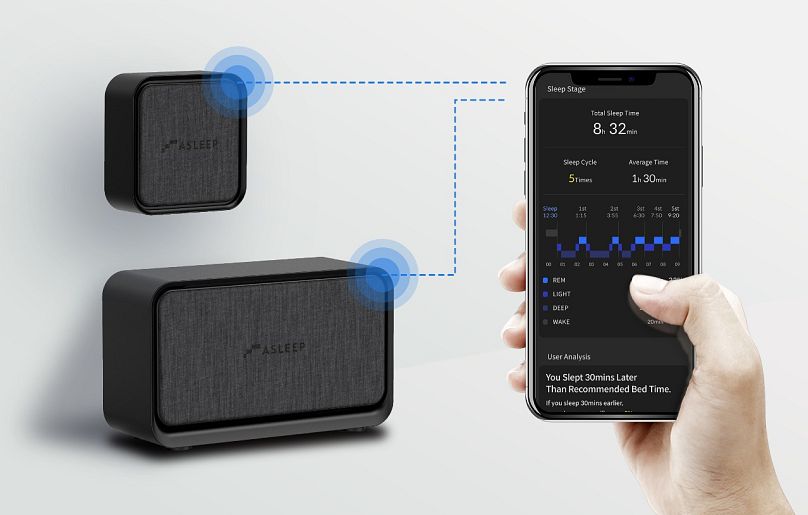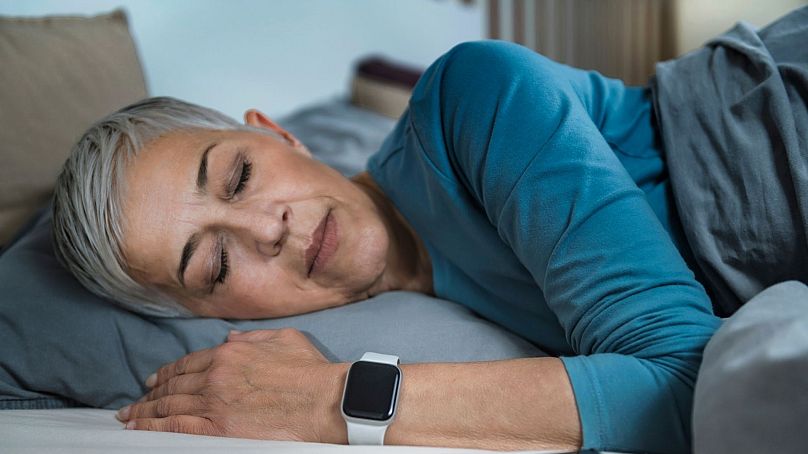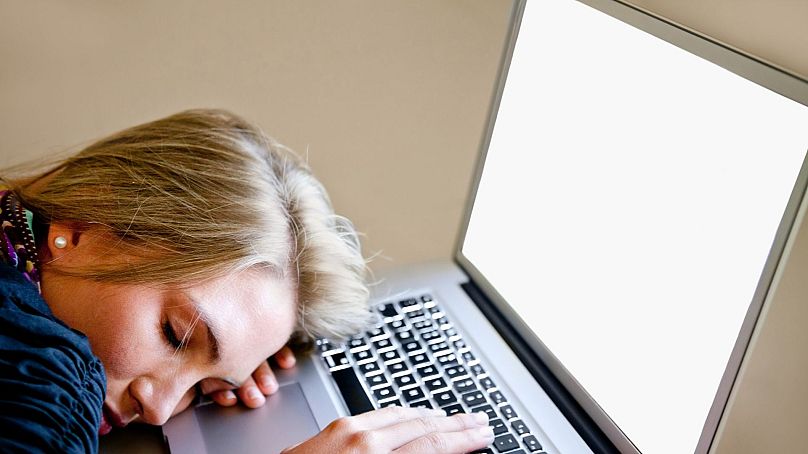The COVID pandemic has wreaked havoc on our sleep. Can sleep technology help us drift off?
A lack of sleep not only makes us grumpy in the mornings but it can also affect our health too.
There are a range of gadgets out there with many of us reaching for sleep trackers to know how much shut-eye we are getting and if it is enough. But is this sleeping technology beneficial and is it accurate?
The South Korean start-up Asleep has built a new Artificial Intelligence (AI) and Internet of Things (IoT) based technology, which it claims is more accurate than standard sleeping apps, and will send you reports and recommendations on how to improve your sleep.
It is also one of the few sleeping technologies that you do not have to wear on your body.
Though not yet available to consumers, Asleep is working on a project with US top smart speaker company to integrate its sleep tracking technology into the device. It has also recently raised over €12 million in investment since its launch in June 2020.
How does it work?
The technology uses two small monitors which you sleep between; one is a transmitter and the other a receiver. It calculates body movement, respiratory and breathing patterns through measuring sound and radio frequency signal algorithms via Wi-Fi.
It combines the inputs through a sensor fusion for sleep tracking and apnea (slow or stopped breathing) detection.
The data is then collected and put through the app’s AI-based analysis. The company says this can then give you a "medical-grade diagnosis" at your fingertips.
It estimates your sleep stage and sleep quality, gives you a diagnosis, sleep score, and can even predict possible future heart disease and a mental illness.
It is generally recommended that adults should sleep at least seven hours per night on a regular basis for optimal health. Less than that can result in weight gain, obesity, diabetes, heart disease, depression, increased risk of death and can also be associated with impaired immune function.
During the pandemic, many have reported that sleeping well has become harder.
A UK study in April 2020 found that 36 per cent of respondents aged 35-44 found lockdown had disturbed their sleep. In Greece, a study in May 2020 showed nearly 40 per cent of respondents had insomnia and in China during peak lockdown, insomnia rates rose from 14.6 per cent to 20 per cent.
"We want to make our technology available to all users to essentially improve their sleep because we noticed that it's such a big problem worldwide," Paul Lee, Chief Global Officer (CGO) told Euronews Next.
The five stages of sleep
But it’s not just the amount of sleep you are getting that is important - sleep quality is also critical.
Scientists have categorised five sleep stages based on the characteristics of the brain and body during sleep.
Stage one is the lightest, followed by a deeper sleep at stage two. The third and fourth stages are known as deep sleep, which progress by level.
The fifth stage is called REM sleep, which is the stage associated with dreaming. It’s during this stage that the skeletal muscles do not move and breathing becomes more irregular.
Are sleeping technologies accurate?
These sleep stages are usually monitored by a polysomnography (PSG), which tracks brainwaves and body movements.
But it’s impossible to carry out these tests - which are considered the gold-standard of sleep tracking - outside of a laboratory or hospital setting.
This has given rise to sleep apps or wearable technology that you can use at home to monitor your sleep, such as Fitbit among scores of others.
While such technologies can be accurate in determining if you are asleep or awake, just by measuring your body movements and breathing, they are found not to be as accurate when monitoring the different stages of sleep.
A study published this year in the journal Nature and Science of Sleep found that most wearable sleep tracking devices were not accurate in quantifying sleep stages (REM and non-REM).
"What trackers can do to a relative degree is measure how long you've been asleep," said Neil Stanley, director of sleep science at Sleepstation, a clinically validated sleep improvement programme.
"It cannot measure light sleep or REM sleep. That can't be done because these are defined by the brain," he told Euronews Next.
How accurate and secure is Asleep?
But the technology at Asleep claims to be incredibly accurate.
Partnering with Seoul National University Bundang Hospital Sleep Center, the company tested its technology on more than 3,000 people. It found that it was about 77 per cent as accurate as the sleeping tests performed in hospitals.
Lee also says it has an AI model that can predict sleep stages that is highly related to brain signal.
One of the key objectives for the South Korea-based company is creating an accurate device that is also comfortable and does not require the wires or machinery to be worn on the body.
Another way the company says it is more accurate than other sleep tracking devices is that it provides personalised sleep recommendations which is done by its Wi-Fi tracking technology.
"We pride ourselves in the accuracy of providing the in-depth information about users REM level and sleep cycle information, so we can give users the recommended bedtime, recommended wake time so that users can have the most optimal sleep," Lee said.
The company says this is different to other sleeping apps, which use rule-based solutions that are not customised to users.
The start-up, which has a staff of 20, is for the moment focusing on South Korea’s market but it plans to go global. But entering the European market has been difficult.
"In terms of entering the European market, the regulation and the certification process is different for each individual European country," Lee said.
He also said security concerns make it difficult to enter Europe’s market. But the Asleep device is secure as its Wi-Fi technology is approved by the US' Food and Drug Administration (FDA) and is proven to be non-hazardous.
As for data privacy concerns, the company uses a cryptic code so the data that is not necessary is removed while the data used is kept safe.
Asleep is hoping the device will become available for consumers by 2022 and wants it to be affordable for all consumers at a guide price of €65.
When sleep becomes unhealthy
While knowing the amount and the quality of the sleep we are getting can help us make better decisions, such as when to stop consuming caffeine or knowing what time to go to bed, it is important not to get lost in the technology to achieve the "perfect" sleep.
Several years ago, a new condition was coined called orthosomnia, the medical term for the obsession for the perfect sleep.
Stanley said sleep tracking apps can lead to orthosomnia and make us see sleep as a "competitive sport".
While he admits as a society we are not respecting sleep as much compared to previous decades when nightlife ended earlier and we did not have phones and laptops to keep us up at night, we have forgotten the sleep fundamentals.
"Now we've got the ability to forgo our sleep. That's the problem," Stanley said.
"Sleep is now seen as the thing we have to do rather than the thing we want to do. It's a pleasure and we don't see it as a good thing".














